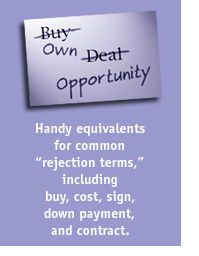
Using "Go Ahead" Terms
| Продажи | ||||
| Sales.com | ||||
| Selling e.., | ||||
by Graham Denton
Everybody likes to buy, but nobody likes to be sold. That nugget of wisdom, which ought to be engraved over the portal of every sales office in the world, underlies a central paradox of the salesperson's work. On the one hand, our livelihood depends on selling professionally, on our making it easy and agreeable for people to buy. On the other hand, if they think this is what we're doing, they won't buy. Almost out of orneriness sometimes, they'll resist agreeing to something they know is in their best interest because they have a conventional distaste for the selling profession.
 One
technique that deflects this distaste is the replacement of what Tom Hopkins
calls "rejection terms" with a less threatening vocabulary of "go ahead
terms." The technique involves little more than some simple linguistic
adjustments. It's easy to use, and it serves to set the customer's mind
at ease because it enables him to see your interaction in "non-selling"
terms. In his seminars, Hopkins gives a list of seventeen "sale-breaking
rejection words that create fear," along with their go-ahead equivalents.
One
technique that deflects this distaste is the replacement of what Tom Hopkins
calls "rejection terms" with a less threatening vocabulary of "go ahead
terms." The technique involves little more than some simple linguistic
adjustments. It's easy to use, and it serves to set the customer's mind
at ease because it enables him to see your interaction in "non-selling"
terms. In his seminars, Hopkins gives a list of seventeen "sale-breaking
rejection words that create fear," along with their go-ahead equivalents.
Here they are:
|
Instead of saying |
Say |
|
commission |
fee for service |
|
cost or price |
total investment |
|
down payment |
initial investment |
|
monthly payment |
monthly investment |
|
contract |
paperwork OR agreement |
|
buy |
own |
|
sell |
get you involved |
|
deal |
opportunity |
|
sign |
OK, approve, OR authorize |
|
pitch |
presentation |
|
problem |
challenge |
|
objections |
areas of concern |
|
cheaper |
more economical |
|
customers |
the people we serve |
|
looker |
researcher |
|
prospect |
future client |
|
appointment |
stop by OR visit |
While some of these equivalents may sound a little forced, there's little question they can have an ameliorating effect on the tension that's sometimes a part of the buy-sell encounter. That's the magic of verbal nuance. When you switch from the "rejection" to the "go ahead" lexicon, you're not doing anything different. It just sounds that way because your language is saying to the customer, "I'm not selling you."
Dubious? Listen to the difference between these two sentences. First: "Jim, I know you've got some objections regarding the cost, so maybe we ought to look at a cheaper option that we've been able to offer our other customers." Second: "Jim, I know you've got some areas of concern regarding the total investment, so maybe we ought to look at a more economical option that we've been able to offer other people we serve." If you were Jim, which sentence would make you feel more at ease?